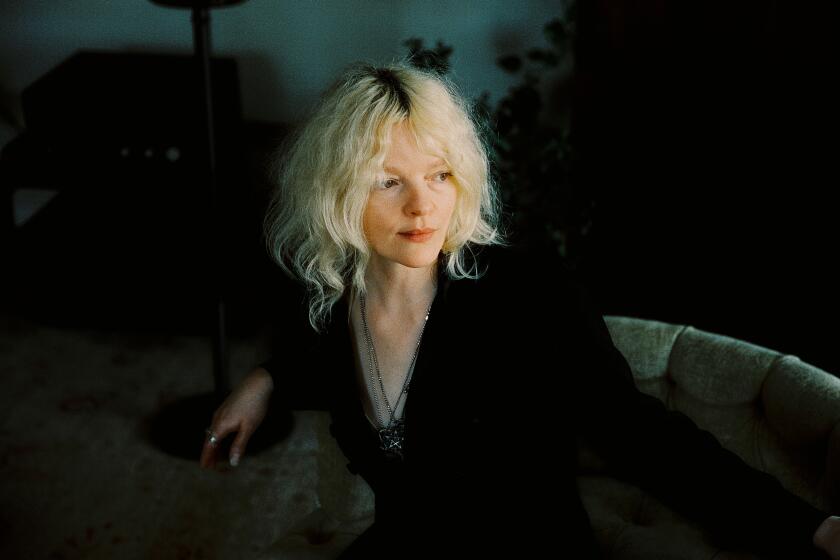A Legend Unsung
Her audience had just rolled off a tour bus and into Babe’s and Ricky’s Inn, the Leimert Park blues club. But Mickey Champion didn’t waste any time in getting to know them.
Decked out in an orange-beige top with gold-colored buttons and cowboy frills, pants cut above the knees and a Southern-belle straw hat, the short, amply-proportioned singer wriggled her shoulders suggestively and raised her left hand into the air while belting out the ribald lyrics to “Dr. Feelgood.”
Moving through the room, she singled out two men and put her left leg on their table as they smiled guilty smiles. A few minutes later, she pierced the air with the opening lyrics to the ballad “Since I Fell for You,” her powerful, throaty voice socking the crowd right in the gut.
For some 50 years, this vital link to L.A.’s rich musical history has been burning up nightclubs with a flammable brand of no-holds-barred blues vocals. In a career that has stretched from the heyday of L.A.’s fabled Central Avenue music scene to the current resurgence of roots music, she has shared the stage with Billie Holiday, Dinah Washington and Sarah Vaughan and influenced such figures as Linda Hopkins and Barbara Morrison. She is regarded by her peers as one of the supreme talents of her time, a performer whose ability and longevity have conferred upon her legendary status.
“She’s one of the greatest singers out there,” says saxophonist Big Jay McNeely, an R&B; star who used to jam with Champion back in the ‘40s and ‘50s.
But Champion’s is a legend that has remained mostly in the shadows. Her voice is not heard on the airwaves, nor does her name appear in books that chronicle the history of L.A.’s seminal black music scene of the ‘40s and ‘50s. It is only in the last two years that she has become known to local blues fans outside of South-Central.
Thanks to her endurance, the 70-ish Champion (who declines to give her age) is now attracting the attention of a wider audience. She has appeared at such twentysomething venues as Three of Clubs and Spaceland as well as tony establishments like Lunaria and Farfalla on La Brea. Her life is the subject of an upcoming documentary titled “Champion Blues,” and a faithful core of supporters is working to gain her broader exposure.
All of which may, in Champion’s eyes, be beside the point.
“I never stopped singing,” she says. “And so I’m still singing. I just sing, and put it in the Lord’s hands, whatever way he sees fit for it to happen. I’m different from a whole lot of people.”
*
Born in Lake Charles, La., the former Mildred Sallier was performing with a vocal trio in high school, and was already good enough to turn the head of renowned bandleader Louis Jordan.
“He was down there playing in Lake Charles,” recalls Champion, who still speaks in the warm, sinewy inflections of her native state. “So I did a little song with him, and then they came by the house and they wanted to take me along with them. But honey, there was no way my auntie and uncle were going to let me go out there like that.”
Despite her early exploits, Champion never intended to go into show business. But soon after moving out to L.A. with her new husband in the mid-’40s, she found herself singing in a club called Jack’s Basket Room on Central Avenue.
The 17-year-old Champion had landed right in the heart of a musical hothouse the likes of which have not been seen before or since in L.A. Many of the world’s greatest jazz, blues, and R&B; figures were nurtured in the clubs of Central Avenue, which also attracted Duke Ellington, Count Basie and every other leading black artist from around the country.
For a young performer, it was like having the run of a musical candy store. “I’d just go up on Central and look at the other singers. Billie Holiday, Jimmy Witherspoon, T-Bone Walker--you name ‘em, every last one of ‘em, I would go up there and hear them.”
Champion herself quickly gained a reputation as an exceptional live performer who could bring down the house--without the aid of amplification. “She was a hot ticket then,” says Linda Hopkins, who first saw Champion in the Bay Area in the late ‘40s. “She was a great singer and a great entertainer. . . . I had never seen someone in a nightclub without a mike.”
Champion toured widely, sharing the bill with everyone from Holiday in Detroit to Vaughan in Kansas City. She was the first vocalist to travel with Percy Mayfield after he recorded the hit “Please Send Me Someone to Love,” and eventually joined Roy Milton, a top bandleader whose 1945 recording of “R.M. Blues” had helped usher in the R&B; era. In the ‘50s, she recorded with several small labels, and in 1957 she sang four cuts on a Holiday album.
But a hit record--and the fame that goes with it--eluded her. “I had record contracts,” says Champion. “Shoot, they just held the contracts, didn’t even call me in. . . . That would be the big companies that could really help me to get a hit record. But everybody who had the small companies really, really, really tried. And that’s the honest God’s truth. Because they really didn’t know how.”
According to her contemporaries, Champion’s inability to gain commercial success and wider recognition--a fate that befell more than a few of the talents that burned brightly on Central Avenenue--was more a reflection on the music business than on her.
“That’s the luck of the dice,” says Johnny Otis, the famed bandleader who chose Champion to stand in for an underage Esther Phillips at club dates after Phillips hit the charts with “Double Crossing Blues” in 1951. “Had she made a record that had appealed to the public and become a hit, she would have become famous. She’s a better singer than many people who got hits. . . . We always knew she was one of the best.”
Hopkins believes that Champion’s career may have suffered for another reason. “I don’t think she made it as big as she could have because she was always trying to help others.” says Hopkins, noting that Champion often took it upon herslef to dole out advice to younger performers.
By the mid-’50s, the Central Avenue scene that had spawned Champion and so many other artists was on its deathbed. When the pop-music landscape shifted and the gigs dried up, she landed a position as a cook with the L.A. Unified School District to support her family (she has seven children and has been married twice). She loved the job and ended up staying for more than 20 years, singing only on weekends.
These days, Champion is dishing out the same kind of torchy blues vocals that she was delivering half a century ago. And audiences are eating it up.
In late June, Champion went to the Monterey Blues Festival at the urging of her friend Barbara Morrison. “She killed them,” says Morrison, who has known Champion for 25 years. “All she did was go ‘uh-uh-uh-uh,’ and the people just screamed.”
In the last two years, Champion has once again begun to venture beyond such South-Central spots as Babe’s and Ricky’s Inn and the Living Room, thanks in part to British film and video producer Paul Spencer. When Spencer first saw Champion at the original Babe’s and Ricky’s on Central (the club reopened in Leimert Park last year), he was immediately taken with her and became her unofficial manager.
“I’m a big blues and R&B; fan, and I recognized in her living history,” says Spencer. “I talked to [blues singer] Charles Brown, and he said that Big Mama Thornton and Mickey are the last of a dying breed of singers. She’s lived through so much music and sung with such great people.”
Looking to generate a crossover audience, Spencer booked Champion at such venues as Spaceland in Silver Lake and Three of Clubs in Hollywood. Spencer had some luck in booking other dates, but grew frustrated with venues that would offer midweek shows and expect him to bring in a crowd. He also wrestled with the idiosyncrasies of a woman who by all accounts does exactly what she wants.
“She wouldn’t always deliver the goods,” says Spencer. “She’s a very undisciplined talent. I would get so pissed off at her, she would do two or three songs and then she wouldn’t do any others. . . .
“I think historically with people who are great talents, and she is, there’s a dark side,” adds Spencer, who has produced music videos for such groups as U2 and the Rolling Stones. “There’s the mediocre, hard-working cabaret singer who can keep slogging along and get those shows. But with Mickey, there’s an element of danger. She’s on the edge, she likes to drink and party. She lives life to the full. That’s why her singing is so genuine, so powerful, because it’s real.”
Paul Marshall can attest to the power of Champion’s singing. An Emmy Award-winning production sound mixer who has also made documentaries, Marshall caught her act a year and a half ago at Smokin’ Johnnie’s in Studio City. Before the night was out, he was hooked.
“I see this lady who’s belting out the blues like you’ve never heard before,” says Marshall. “She would walk from the stage to the patio to the bar, and it was the same volume. The hair on the back of my neck stood out.”
Marshall and his wife Aletha Rodgers, also a production sound mixer, have spent the last year and a half working on a documentary about Champion. It’s been an exhilarating, and exhausting, odyssey.
“She has a zest for life that will burn out anyone who tries to follow her,” says Marshall, who hopes to complete the film by December and have PBS air it for Black History Month. “She never stops.”
The front door swung open without warning as a small group of people congregated outside Babe’s and Ricky’s one night. Standing there was Champion, singing without a microphone in a thunderous voice that belied her five-foot frame. She belted out a few bars, as if to rouse the city from its slumber, then disappeared back into the club.
And so the Mickey Champion show goes on, no matter how many are there to catch it.
“Whatever happens I’m glad that it happens,” says Champion. “That’s the type of person I am. That’s the way I look at it, because I know that I’m blessed, and I’m thankful.”
*
Mickey Champion plays every Sunday at the Living Room, 2636 Crenshaw Blvd. 9 p.m. Free. (213) 735-8748. Also every Thursday at Babe’s & Ricky’s Inn, 4339 Leimert Blvd., 9 p.m. $5. (323) 295-9112.
More to Read
The biggest entertainment stories
Get our big stories about Hollywood, film, television, music, arts, culture and more right in your inbox as soon as they publish.
You may occasionally receive promotional content from the Los Angeles Times.






